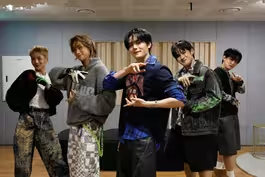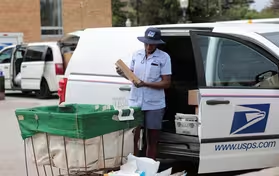
Why uterine fibroid awareness is low despite being pervasive
Clip: 7/26/2025 | 5m 39sVideo has Closed Captions
Why uterine fibroid awareness is low despite affecting a large percentage of women
From unbearable pain to feeling no symptoms at all, women with uterine fibroids can have vastly different experiences. While these growths affect a large percentage of women, health advocates say they too often go undiscussed. Ali Rogin speaks with Sateria Venable, a patient advocate and CEO of The Fibroid Foundation, to learn more.
Problems playing video? | Closed Captioning Feedback
Problems playing video? | Closed Captioning Feedback
Major corporate funding for the PBS News Hour is provided by BDO, BNSF, Consumer Cellular, American Cruise Lines, and Raymond James. Funding for the PBS NewsHour Weekend is provided by...

Why uterine fibroid awareness is low despite being pervasive
Clip: 7/26/2025 | 5m 39sVideo has Closed Captions
From unbearable pain to feeling no symptoms at all, women with uterine fibroids can have vastly different experiences. While these growths affect a large percentage of women, health advocates say they too often go undiscussed. Ali Rogin speaks with Sateria Venable, a patient advocate and CEO of The Fibroid Foundation, to learn more.
Problems playing video? | Closed Captioning Feedback
How to Watch PBS News Hour
PBS News Hour is available to stream on pbs.org and the free PBS App, available on iPhone, Apple TV, Android TV, Android smartphones, Amazon Fire TV, Amazon Fire Tablet, Roku, Samsung Smart TV, and Vizio.
Providing Support for PBS.org
Learn Moreabout PBS online sponsorshipLISA DESJARDINS: From unbearable pain to feeling no symptoms at all, women with uterine fibroids can have vastly different experiences.
And while these growths impact a large percentage of women, health advocates say they too often go undiscussed.
That has now started to change as women share their stories, including Academy Award winning actress Lupita Nyong'o and tennis superstar Venus Williams.
Ali Rogan spoke with Sateria Venable, a patient advocate and CEO of the Fibroid Foundation.
ALI ROGIN: Sateria Venable, thank you so much for being here.
SATERIA VENABLE, Fibroid Foundation CEO: Thank you for inviting me.
I really appreciate it.
ALI ROGIN: You yourself have experienced uterine fibroids.
Tell us more about what they are and what your own journey with them has been like.
SATERIA VENABLE: Uterine fibroids are noncancerous growths in and around the uterus.
And the word noncancerous is really important because a lot of people who are diagnosed don't know whether they're cancerous or not.
And what led me to this journey is I had my third fibroid surgery.
I've had four total and I couldn't find a provider to care for me who wouldn't offer a hysterectomy.
And I lived in Chicago at the time, and I thought, if I'm living in a major metropolitan city and I can't find a provider, what are other women experiencing?
And I just wondered why people weren't screaming from the rooftops, because until that time, I thought that I was alone in my journey, which is another recurring theme that we hear from our community.
ALI ROGIN: It's truly extraordinary how many women this affects.
What do we know about any groups of women among whom the risk is greater or the symptoms are more prominent?
SATERIA VENABLE: We know that 70 to 80 percent of all women will be diagnosed with uterine fibroids by the age that they're 50.
And there's a misnomer that it's primarily women of African descent, because we do know that women of all walks of life, all ethnicities, have fibroids.
ALI ROGIN: What does the range of symptoms look like?
SATERIA VENABLE: It can be really exhaustive.
Women have pain, they're gasping for air, and don't really realize that their lung capacity has been reduced by the anemia.
There can be complications.
A lot of our community members find out that they have fibroids when they're either pregnant or trying to conceive.
And then it becomes a real issue because sometimes, because of the surge in estrogen during pregnancy, the fibroids can grow as quickly as the fetus and sometimes crowd out the fetus and cause issues.
ALI ROGIN: What are the treatment options for this?
SATERIA VENABLE: So we have a few treatment options and some medical therapies that were approved during the pandemic that aren't widely known.
If you're looking to conceive, the most frequently utilized therapy is a myomectomy, which can be either open incision in the abdomen, which is just really tough to recover from.
And then the medical therapies, I really think about them as tools because they can help you to stabilize your body, to combat anemia and to have your body recover to some degree while you're trying to understand what fibroids are and what treatment option I should pursue.
But we really don't have enough treatment options for this.
And hysterectomy, sadly, accounts for half of the 600,000 hysterectomies that occur annually in the United States.
ALI ROGIN: And as is so often the case, women's health research into it has been systematically under invested in what would the addition of investment attention do to this ailment that affects so many women around the world.
SATERIA VENABLE: So investment in this would be huge.
We're trying to get more research dollars on two fronts in general legislation through NIH research and also under the military umbrella for military readiness because our service members are suffering with fibroids and endometriosis and other women's health concerns.
So the research would look at finding new treatment options, really understanding -- we don't understand how fibroids behave in the body, really, because there hasn't been enough research.
And so a package of bills was introduced last week by several members of Congress that will look at various aspects of research and understanding fibroids, screening for fibroids, understanding endometrial cancer, and also recognizing July as Fibroid Awareness Month.
ALI ROGIN: The Trump administration so far has cut a number of research projects devoted to various ethnic minorities to women.
And so I wonder, how are you feeling about the future for investment in uterine fibroids specifically, as we're in this particular moment, politically.
SATERIA VENABLE: I am not deterred.
My whole life I've kind of bucked the system and tried to find solutions.
And so that's what I'm doing in this moment.
We are moving full steam ahead.
We're finding partners who understand and agree and empathize.
And I encourage anyone who doesn't really see this as a priority to go home and talk with the women and menstruators in your family.
And whenever I hit invite anyone to do that, they come back and say, oh my God, I didn't know my mother had a hysterectomy due to fibroids.
I didn't know that my sister is suffering right now or that she had birth complications.
And it really opens their eyes to this issue.
ALI ROGIN: Sateria Venable, founder and CEO of the Fibroid Foundation.
Thank you so much.
SATERIA VENABLE: Thank you for having me.
Aid worker in Gaza sees sharp rise in malnourished children
Video has Closed Captions
Clip: 7/26/2025 | 5m 42s | Aid worker in Gaza sees ‘catastrophic’ rise in malnourished children and families (5m 42s)
K-pop band 1VERSE debuts with two North Korean defectors
Video has Closed Captions
Clip: 7/26/2025 | 3m 30s | K-pop band 1VERSE, featuring two North Korean defectors, makes global debut (3m 30s)
USPS navigates challenges as it celebrates 250th birthday
Video has Closed Captions
Clip: 7/26/2025 | 5m 30s | USPS navigates financial challenges as it celebrates 250 years of service (5m 30s)
Providing Support for PBS.org
Learn Moreabout PBS online sponsorshipSupport for PBS provided by:
Major corporate funding for the PBS News Hour is provided by BDO, BNSF, Consumer Cellular, American Cruise Lines, and Raymond James. Funding for the PBS NewsHour Weekend is provided by...














